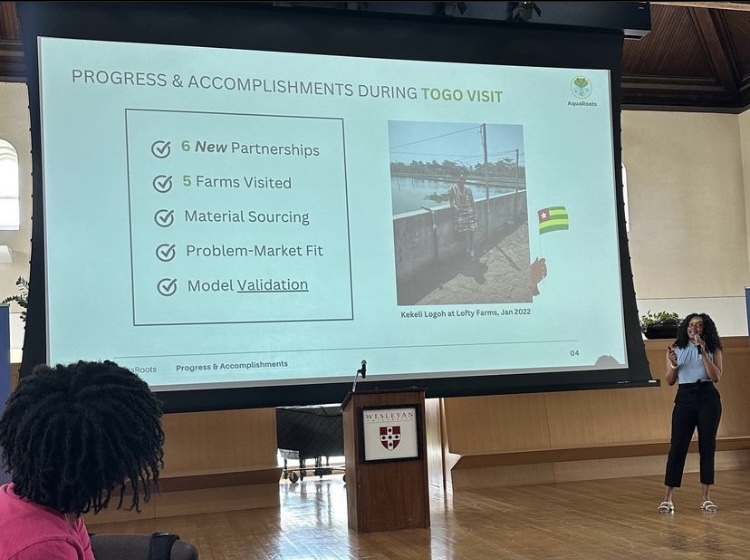
c/o Wesleyan University
The Patricelli Center for Social Entrepreneurship (PCSE) announced the three winners of the New Venture Awards on Tuesday, April 18: Aquaroots (Kekeli Logoh ’23), Concussion Box (Eliana Bloomfield ’25), and Pazu Productions (Romy Beckman ’25). The awards, which aim to support student organizations addressing social issues, were founded in 2013 and named “Seed Grants” until this year. Each of the three winners, selected from a group of seven finalists, will receive $5,000 and will have access to PCSE resources, assistance, and professional opportunities.
Aquaroots is a venture that looks to establish aquaponic systems in Togo to help transform farming and the community through its sustainability, productivity, and nutritional diversity. Logoh, who was born in Togo and moved to the United States at age seven, returned to Togo for the first time in 2021 and has felt a desire to give back to the community. She learned about aquaponics last summer and embraced the concept as a way to help with Togo’s agricultural industry.
“I was thinking about ways I could get back to my community, and I learned about aquaponics, and this was also the right time,” Logoh said. “I joined this social entrepreneurship challenge [the Fishbowl Challenge] around that time, and everything just came together for me to be like, ‘Okay, this is a time for me to help.’”
Aquaponics, a concentrated agricultural system that pairs aquatic organisms, like fish, with hydroponic, or water-cultivated, plants. The presence of fish provides nutrients to the plants, which in turn purify the water. This helps reduce food waste and generate more fresh food and produce.
Logoh explained how food waste could be fed to the fish, or alternatively made into fish feed by feeding it to livestock and using their feces. The water from the aquaponics system could be used for fertilizer, and the fish could be eaten as well. She plans to return to Togo in June after graduating to get the aquaponics system started on a farm.
“It’s a relatively new thing [in Togo]. So if I actually wanted to plunge into that, I would have to be there and be able to train farmers and people to be on that. So, that’s why it’s important for me to be there before I start anything,” Logoh said. “My [goal] milestone by the end of the summer is just to actually have a basic aquaponics system.”
Concussion Box is an organization to support people with concussions through its audio library of concussion stories and care packages. Bloomfield was prompted to create Concussion Box by her own experience with a concussion at age 14.
“I was out of school for a little while, but my whole recovery took about a year,” Bloomfield said. “And throughout that process there was a lot of focus on ‘what are my symptoms,’ and the very technical medical side of it, but there wasn’t a lot of focus on the isolation. It wasn’t until after I was mostly recovered that I talked with others and realized that feeling that sort of isolation from concussions was actually really common. So that’s where the idea for Concussion Box came from—that there’s got to be some creative way to fight the isolation of concussions.”
Bloomfield began working on the project about a year and a half ago and obtained 501(c)(3) status from the IRS last September. She plans to grow the organization in the near future through care package partnerships and expanding content and the online audio library.
“[The audio library is] at 25 [stories],” Bloomfield said. “We want to be at 50 and beyond in the next two years, and we want to get our care package initiative really [developed] more. So we’re [Concussion Box] running stage two of beta testing right now and working with Yale [University] and Wesleyan and hopefully a couple more organizations. So the hope is that we can have those care packages, which will then lead people to the audio library, consistently [being] in hospitals and universities or other schools around the area. We’re also working on a podcast that deep dives into some more of the stories, with the first two episodes underway.”
Pazu Productions is a media production company that works with activists and nonprofit organizations to promote social action and organizing. The company is currently collaborating with Dr. Gary Altheim, the founder of Growth and Development Services Inc., to create a documentary on Alzheimer’s and dementia patients.
Beckman could not be reached for comment.
The three winners will continue to expand their projects in the coming year with the support of the Patricelli Center.
Spencer Landers can be reached at sklanders@wesleyan.edu.